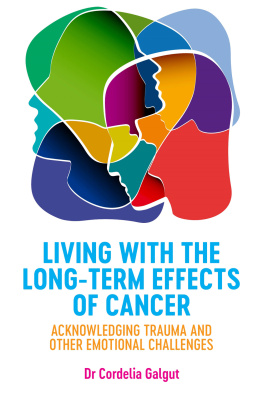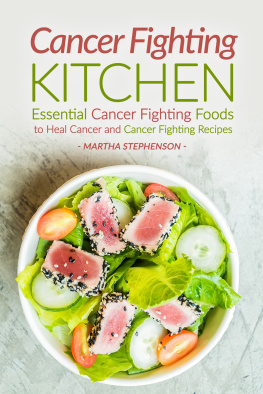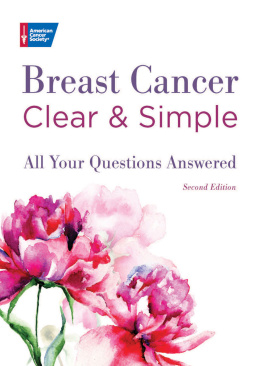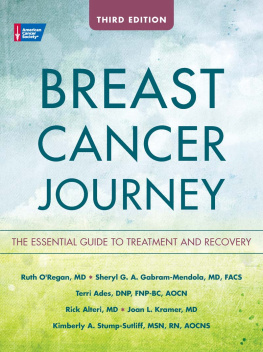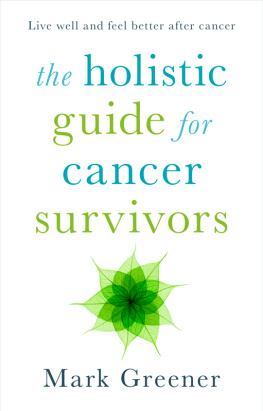
LIVING WITH THE LONG-TERM EFFECTS OF CANCER
Acknowledging Trauma and other Emotional Challenges
Dr Cordelia Galgut
Illustrated by Louise Bourgeois

CONTENTS
INTRODUCTION
This book is for a wide audience. Moreover, given that estimates predict that one in two of us will receive a diagnosis of cancer in our life times (Cancer Research UK 2015), or will be affected by it second hand, in a sense this book is for us all, especially since these days growing numbers live on after a cancer diagnosis (Macmillan Cancer Support 2019).
In the first instance, however, this book is for the many living with and beyond cancer, coping with its long-term effects, both physical and emotional, whether they be more or less severe. I hope this book offers new and welcome support and insights for those of you in these situations, by delving into areas that are not often spoken about but that affect many of us.
In revealing some of the actual reality of what we endure, I hope that you will feel that your suffering is understood and taken seriously. I also hope that reading my stories, and those of others who have long-term effects, whose quotes I
This book is also for the families and friends of those living with the long-term effects of cancer, and also for anyone interested in this subject. I hope that the book informs and supports this group of people too.
Last, but not least, this book is for those who work in cancer care at every level and in every area. I know that there are many committed people working in this field who make a huge difference to the quality of life of people coping with cancers long-term effects, in spite of limited resources. I really hope that this book raises awareness of and validates the work that you do.
I trust that this book will also serve to enlighten those in the cancer field and related ones who are keen to know more about the psychological and physical long-term effects of cancer, and that it will contribute to a body of knowledge about the reality of life years after diagnosis and treatment/s.
I am also hopeful that it will encourage debate, by high-lighting little known issues that need serious and prompt con-sideration, in order to improve the quality of life for those who suffer long term. Their needs are currently not being adequately met in the UK and very possibly elsewhere in the world too.
A dual perspective
I chose to write this book from the dual perspective I have, as a psychologist who had breast cancer and who is coping with the long-term effects of treatments I received 15 years ago. While this seems more honest to me, I imagine that there will be those who criticise me for it. I am hopeful that those who read this book, including healthcare professionals will recognise that in embracing my insider bias, I am potentially adding breadth and depth to what I write, rather than the reverse, not least because, as Liz, who has had cancer, says, The professional voice is usually heard above all others. In writing from my dual perspective, I am hoping to right that balance a little, as well as support others living long-term with cancers effects, who feel validated when health professionals and others speak out from their dual perspectives.
I also hope to contribute to the debate about whether it is possible to be both ill and vulnerable, and powerful and productive, both in the work domain and elsewhere. Obviously, I believe it is possible to inhabit and embody both states, and trust that I am living proof of that, although I am aware that others might disagree.
Limitations
There will, of course, be distinct limits to the ground I can cover in this book and there will subsequently be a fair number of omissions, for which I apologise in advance. This is also a relatively short book, which further limits the details I can include. Frustratingly, I have only been able to scrape the surface of some issues, each of which warrants a book itself.
Furthermore, while I am assuming some commonality of experience between cancers longer term I also acknowledge that there will be many differences too for example, a mans experience of prostate cancer is not likely to be the same as a womans experience of breast cancer. Equally, peoples long-term experience of the same cancer will very possibly differ as well as chime with others experiences. I also acknowledge that my personal experience of cancer is limited to breast cancer.
Additionally, since I am a psychologist and not a medical person, this books primary focus is on the psychological impact of cancer in the long term and not the physical, although clearly the two are inseparably intertwined each one affects the other, and many physical effects are mentioned in this book.
There are also differing opinions about what a book about the long-term effects of cancer should cover. For example, out of respect to those with a secondary diagnosis, where there is spread to bones and organs, some would say that I should not even attempt to consider this area since I do not have a secondary diagnosis myself. They might well say that this aspect should be covered separately in a book dedicated solely to secondary cancer sufferers issues and needs. Others might say that my lack of first-hand experience of secondary cancer is not such a problem. They might say that on the continuum of cancer, with diagnosis at one end and the possibility of death at the other, since most cancers can spread elsewhere in the body at any point, a secondary diagnosis can be a long-term effect, albeit a very severe and devastating one.
This is obviously a complex area, and I am not exactly sure where I sit regarding it. However, in my personal opinion, whether our diagnosis is primary or secondary, one thing many of us do suffer from, to a greater or lesser degree, is lack of awareness of our situation and lack of help and support with it. So it could be argued that, to this extent, primary and secondary cancer survivors are all in the same boat, and I have tried to reflect this in what follows, as well as I am able.
Additionally, I apologise if I appear to make unfair judge-ments about any person or group of people. And I apologise if I seem to imply at any point in this book that I think cancer is the only life-threatening illness that has long-term effects. If I appear to do so for either the former or the latter, please understand that this is not my intention, which is rather to highlight and unpick, as best as I can, the complex issues related to the long-term effects of cancer, for the benefit of everyone concerned no more and no less.
For the purposes of this book, long-term effects are defined as any symptoms that started after diagnosis and treatment and that dont go away, whether they are static or have got worse, be they physical or emotional. Additionally, the effects of cancer that were not present after the initial diagnosis and treatments, that come on either slowly or more suddenly, including a secondary diagnosis, are included.
I, interviewed, talked to, emailed etc., a fair number of people, either formally or informally, for the purposes of this book approximately a hundred. My rationale for doing so was to gauge, from their words, what the issues are that have preoccupied them in relation to the long-term effects of cancer. I interviewed both those who suffer from cancers long-term effects, across a variety of cancers, and, additionally, professionals working with those affected. I also talked to a few people who were both long-term sufferers and healthcare professionals, and to some working in related areas; for example, people working for charities. Almost everyone wanted to remain anonymous when quoted in this book, which was confirmation of what I already suspected. At this time in the UK the subject of this book remains a contentious, highly charged area. People wanted their views aired, but for the most part were not willing to risk using their real names or be too explicit about where they worked, etc., a stance I fully understand, given the context.
Next page
